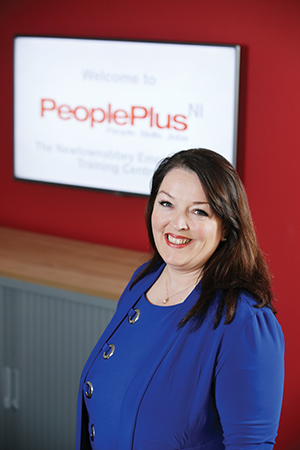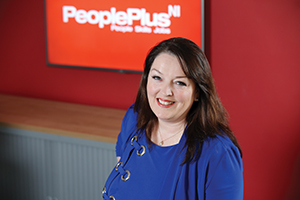Delivering results for Northern Ireland
Tina McKenzie, Managing Director of Staffline Ireland talks to
Adam Morton about Northern Ireland’s employment market and the innovative ways PeoplePlus NI is helping people transform their lives and building an equitable and prosperous society.
 PeoplePlus NI is a leading public service provider in Northern Ireland delivering employability, youth training and family support services in the employment, skills and justice sectors. As part of the global company PeoplePlus, PeoplePlus NI benefits from international expertise and reach, with over 60 programmes currently being delivered across Great Britain, Saudi Arabia and Australia.
PeoplePlus NI is a leading public service provider in Northern Ireland delivering employability, youth training and family support services in the employment, skills and justice sectors. As part of the global company PeoplePlus, PeoplePlus NI benefits from international expertise and reach, with over 60 programmes currently being delivered across Great Britain, Saudi Arabia and Australia.
Locally PeoplePlus NI is part of Staffline Ireland, a group of companies across 12 locations including Diamond Recruitment in Northern Ireland and Staffline OnSite in the Republic of Ireland. Staffline Ireland is managed by a local team led by Managing Director, Tina McKenzie.
McKenzie is recognised as one of Northern Ireland’s most successful businesswomen and aside from running Staffline Ireland she is also the Recruitment and Employment Confederation’s regional director for Northern Ireland and is a member of the Northern Ireland Human Rights Commission’s Business and Human Rights Forum. In bringing the PeoplePlus service to Northern Ireland, McKenzie wants to ensure that citizens’ lives are transformed for the best and that PeoplePlus NI contributes to building a prosperous society.
The primary way PeoplePlus NI does this is by ensuring people have the skills necessary to move into sustainable employment. PeoplePlus NI’s first major contract was the Steps 2 Success contract in the northern region. So far, this contract has helped over 2,000 previously long-term unemployed people into work.
Coming from a recruitment and employment background, McKenzie is well aware of the challenges and needs the labour market will present in the future. “On average our children will have between 10 and 15 jobs in their lifetime, so the ability to transfer skills will be key.”
PeoplePlus NI works closely with employers at a senior level to best understand the biggest needs in the labour market. This close relationship gives it the unique ability to know exactly what jobseekers need to highlight to their potential employer. This way jobseekers are able to speak the employers’ language and highlight the skills they can bring to a job.
“People have been coming at the unemployment problem from the wrong angle,” says McKenzie. “They have been asking what the individual wants in the long-term without considering whether that job is currently available. If someone is struggling to find work for a year or more, it is surprising that considering ‘what does the employer want?’ and ‘how can someone progress from there?’ is a novel strategy. We work with the job seeker to show them what the employer wants and explain to them how to demonstrate that they have exactly what the employer is looking for.
“This strategy means that the jobseeker can make the first step in the door and progress into a career they love whilst keeping their skills in the local labour market.”
After being awarded the Steps 2 Success contract, PeoplePlus NI invested £2 million of its own capital into two bespoke employment training centres, one in the iconic City Factory in the heart of Derry and another in Newtownabbey. Working closely with Northern Ireland’s employers, it is able to use these centres to host its own ‘Host Employer’ academies. These academies replicate the real life work environment and help learners obtain the most in demand skills in their local area by offering practical, hands-on experience.
“It lets people experience work by creating real work environments,” says McKenzie. One example of this is the Hospitality Academy PeoplePlus NI has developed in the North West, where people can practice turning down a room and can gain catering skills in a fully functioning cafe. This ensures jobseekers have the necessary skills to enter employment with local hoteliers and restaurants that are growing with the increased tourism in Derry. “The idea behind this is they will get to make their mistakes with us and try a job before they commit to it while supporting sectors that are growing locally.”
The service doesn’t only cater for careers in hotels and restaurants. It also gives people the chance to experience work in a retail environment. At the warehouse academy in Newtownabbey learners can also gain accredited skills in forklift driving. This model has resulted in over 2,000 people moving into employment since the programme began.
Building Northern Ireland PLC
Whilst employment is McKenzie’s area of expertise, she is also passionate about building Northern Ireland PLC by encouraging as many people to participate in working life as possible, including unemployed young people and ex-offenders who might struggle to reintegrate into society.
In particular, McKenzie wants to ensure young people keep their skills in Northern Ireland, helping build the prosperous society we all want to see.
“PeoplePlus NI’s focus on the jobs available in the local market is what our careers guidance service should be doing in our schools,” says McKenzie. “Too often we are encouraging our young people to leave our shores for jobs that don’t exist locally instead of encouraging them to create the opportunities they want here. We are not seeing the same increase of people starting their own businesses in Northern Ireland as we are in Great Britain – we are not fostering entrepreneurship and we should be addressing that.”
There are more problems with this disconnect. Skills gaps are clearly emerging in the local market yet there are other parts of the labour market were people are struggling to find work with the skills they have gained. “Our careers service is not connected to the employment market. We need more nurses yet we have more teachers than we need,” observes McKenzie. “The jobs are there but unfortunately our young people are coming out of education and not being trained for the jobs that are available.”
Not just focusing on those who are unemployed, PeoplePlus NI is also tasked with improving the visitor experience in Northern Ireland’s prisons, with the aim of helping ex-offenders who have left the prison system reintegrate into their communities and fully participate in wider society. In this role, the company focuses on rehabilitation and the prisoner’s family. It provides guidance for visitors and helps them to support their relative’s rehabilitation. Children with parents in prison are more likely to encounter the justice system later in life, with 65 per cent of boys with fathers in prison going on to offend themselves. For these families PeoplePlus NI provide guidance, financial support, and advice on the current employment market to ensure ex-offenders returning to their homes are entering a supportive environment.
“It may seem like a small impact,” says McKenzie, “But each small impact means there is less chance of reoffending. The aim of this programme is to reduce the reoffending rate and results prove that by putting offenders and the people around them in a supportive environment and into sustainable employment, the risk of reoffending drops substantially.”
“This helps us create the society we want, where all of our citizens participate fully in our communities and where more opportunities are created in our local economy.”
Part of creating these opportunities is about encouraging investment from large companies outside of Northern Ireland. As an experienced business woman who understands the international market and the challenges facing Northern Ireland, McKenzie is aware that its limited selection of large companies is hindering employment opportunities.
“Much of the employment in Great Britain is supplied by these companies, Northern Ireland is missing out,” states McKenzie. “Large firms contribute to 52 per cent of UK turnover whereas in Northern Ireland 75 per cent of our turnover is reliant on small firms. We need to get our language right to potential large employers and investors and get everyone on board. We need to take every job we can get. Every job is a start and even the smallest job can have an impact on a person’s self-esteem, helping them get the next job and progress their career.”
 Results focused services
Results focused services
Reflecting on these issues and how Northern Ireland can boost the economy, McKenzie states that more can be done to ensure the best results from public services by starting from the result and building contracts back from there.
“If you are looking for results and performance, build your contracts around the actual outcomes needed for the economy,” says McKenzie. “Ensure that they must deliver the outcomes necessary and build payment around the performance. This type of contract puts the onus on the delivery agent to ensure success while providing the flexibility for innovation. A target is the best way to ensure you get innovative solutions to meet that goal, until we get that straight in our heads we will be in trouble.”
This results based contract model is the one used by PeoplePlus NI for Steps 2 Success. If its customers do not get jobs, the business will fail. This ensures that it invests as much time and effort as it can into jobseekers, with so far over 30 per cent of those who have completed the programme having moved into employment.
“I would love to see this results-focused model wholly embraced by the public service,” states McKenzie. “We need to look at things in a much more no nonsense way. The public sector has to be as aggressive as the private sector to ensure we are delivering for the people of Northern Ireland.”
“Where we start is the result. We have to be clear about the target and the target in the justice system is to drop the reoffending rate, on the employment side it is to get more people jobs.”
Ultimately, PeoplePlus NI focuses on helping people transform their lives, making their lives better and ensuring that the public sector gets value for money. “People just need the opportunity and a bit of hope to make massive changes in their lives,” states McKenzie.
McKenzie’s ultimate aim is to empower people to build Northern Ireland into a prosperous and equitable society for all. “We have a lot to be proud of in Northern Ireland and we have to sell ourselves to the world but we have to know what the world wants and build public services that deliver.”





